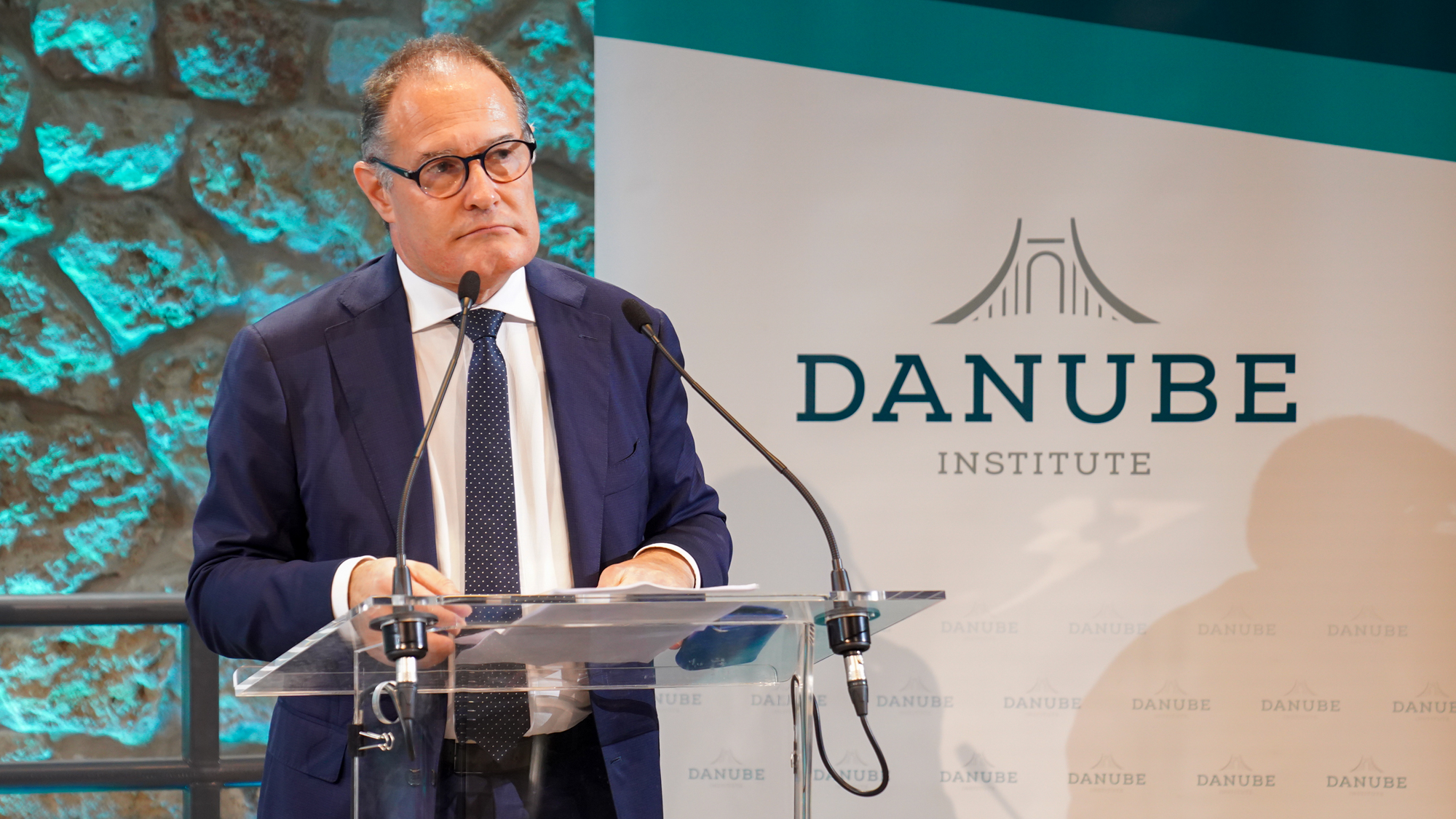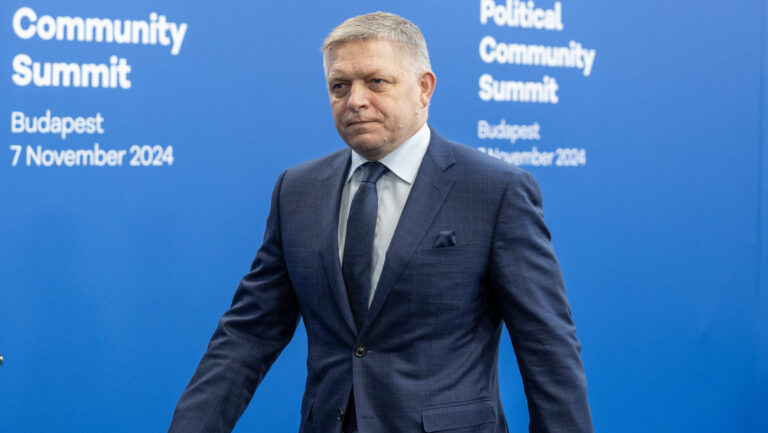Under the title ‘Migration & Citizenship: Can Nations Choose Their Members?’, policymakers and analysts from both sides of the Atlantic debated the meaning of national belonging in an era of mass migration, supranational institutions, and cultural upheaval during the opening day of the 5th Geopolitical Summit, co-organized by the Danube Institute and the Heritage Foundation.
The discussion was preceded by a keynote address from Fabrice Leggeri, former director of Frontex and now a prominent figure within the right-wing Patriots for Europe (PfE) group in the European Parliament. Leggeri opened by pointing to the confusion that surrounds even the most basic terms of the migration debate. ‘There is confusion even over definitions: who is a refugee, who is a migrant, who is a “talent” as they say in Brussels and the Commission?’ he said. The former border chief argued that over time, the European Union had shifted towards a ‘no borders’ ideology, eroding its external frontier while simultaneously blurring the boundaries between residence rights, voting rights, and citizenship.
According to Leggeri, this ideological drift is no accident. ‘The European Commission’s “DNA” has shifted towards a pro-migration ideology, adopting narratives spread by NGOs that portray efforts to protect external borders as morally suspect,’ he warned. The outcome, he argued, has been the destabilization of both borders and identities. ‘Nations lose not only geographic control but cultural coherence, producing parallel societies and multiple, competing identities on the same territory,’ he cautioned.
Leggeri laid out a roadmap for countries seeking to reclaim sovereignty. First and foremost, he said, borders must be enforced. ‘Where states cannot control who enters, build physical barriers and enforce maritime interceptions,’ he urged, noting that his Patriots for Europe group had already tabled budget amendments in Brussels along these lines. He also argued that national constitutions must be amended to shield states from judicial activism at both the EU and international level, and that governments should move decisively to ban ‘woke ideology’ when it undermines national symbols and cultural cohesion. ‘Recent US action protecting the American flag is a useful model,’ he noted.
Another key component of Leggeri’s plan was demographic. ‘Migration policy is also about remaining a majority in our own countries—something that is no longer the case in parts of Europe,’ he said. He called for ambitious pro-family measures and for clearer red lines in citizenship law: those who reject equality between men and women or impose strict dress codes in public should be denied both residence permits and naturalization, he argued. Birthright citizenship rules, too, must be reconsidered, especially in territories like Mayotte in the Indian Ocean, where local services have collapsed under the weight of mass irregular migration. ‘Law must change so birth on the territory does not automatically confer citizenship,’ he said.

Following the keynote, International Director at the Danube Institute Kristóf György Veres moderated a lively discussion between Executive Director of the Migration Research Institute at MCC Viktor Marsai, Senior Fellow at the Texas Public Policy Foundation Ammon Blair, Director of the Patriots for Europe Foundation Raphaël Audouard, and Senior Researcher at the UK’s Prosperity Institute Guy Dampier.
Blair began by outlining the US debate over birthright citizenship. He pointed to Donald Trump’s recent executive action seeking to reinterpret the 14th Amendment. ‘The key dispute is what “subject to the jurisdiction thereof” means,’ he explained. One school of thought insists that anyone born on American soil is automatically a citizen, regardless of their parents’ status; another insists that true jurisdiction requires allegiance, echoing the oath of naturalization in which all prior allegiances are renounced. Blair warned that the current interpretation has allowed unlawful entrants to game the system. ‘Arrive unlawfully, have a child, obtain citizenship by birth—this erodes the meaning of citizenship and creates a two-tier system where citizens are subordinated to foreign nationals protected by parallel arrangements,’ he said.
Blair linked this to a broader problem: the role of cartels in the migrant pipeline. ‘Since the 1990s, cartels have built a system from the Darién Gap through Mexico into the US. Migrants incur debts to these organizations and repay through labour or criminal activity. This is the largest slave trade in recorded history,’ he said.
Marsai brought a Central European perspective, highlighting how clan-based loyalties from failed states complicate integration. ‘People from Somalia, Afghanistan, and elsewhere often have no lived concept of a neutral, effective state. Their loyalty is to clans and tribes. On arrival in Europe or the US, they do not look to the state for support but to their clan networks,’ he said. This, he argued, creates policing challenges and enables organized crime. Sweden, he noted, has seen rising levels of clan-related shootings and bombings, while witnesses often refuse to cooperate due to family and tribal loyalties.
‘The core obstacle is legal: domestic human rights law and supranational frameworks block removals’
From the UK, Guy Dampier outlined Reform UK’s proposals, including the identification and removal of some 600,000 illegal immigrants during the party’s first parliament in office. ‘The core obstacle is legal: domestic human rights law and supranational frameworks block removals,’ he explained. Reform’s solution, he said, is to repeal the Human Rights Act, leave the European Convention on Human Rights, and temporarily disapply parts of the Refugee Convention. ‘That would bar those arriving illegally from asylum and settlement, cutting off appeals,’ he said, estimating costs at £10 billion but arguing that long-term fiscal savings would more than compensate.
Audouard stressed that while legal frameworks pose challenges, politics remains decisive. ‘Law is a battlefield. The “legal order” is not a natural force; it is shaped by political power,’ he argued. He predicted that if patriotic governments take power in major states like France, Brussels will have no choice but to concede. ‘The EU cannot function without France and Germany. Coalitions of patriotic governments can force concessions,’ he said, pointing to shifting attitudes in Italy, Denmark, and the UK.
The discussion also turned to offshore processing and overseas territories. Dampier acknowledged that Britain had considered Ascension Island, but cited logistical hurdles. Audouard firmly opposed proposals to use Mayotte or other French overseas departments as ‘dumping grounds’. ‘They are integral parts of France and should be developed, not turned into holding sites. The humane solution is returns—tied to genuine partnerships with origin countries,’ he said.
In their closing remarks, panellists converged on the need for sovereignty. Marsai insisted that without credible deportations, deterrence collapses. Blair urged the US to codify citizenship and reassert its meaning. Audouard reminded listeners that immigration is inseparable from demographic decline. ‘Without a demographic recovery, our nations decline—even with zero immigration,’ he said. Dampier concluded by arguing that welfare incentives must be changed to ensure migration remains temporary and beneficial.
Related articles:







